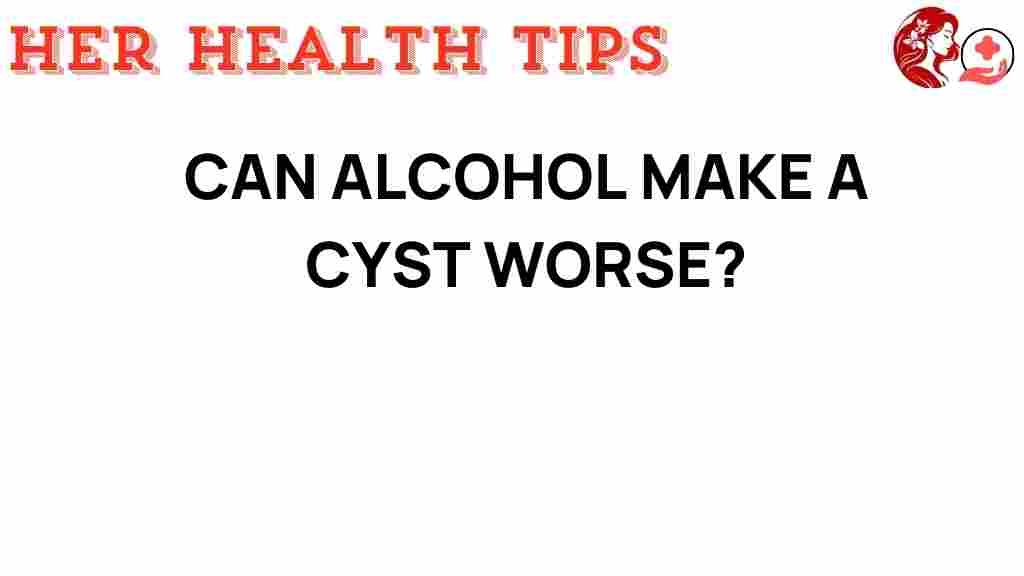Can Alcohol Worsen Cysts? Uncover the Connection
When it comes to our health, understanding how different lifestyle choices impact our bodies is essential. One area of concern for many individuals is the relationship between alcohol consumption and the development or worsening of cysts. In this article, we will explore how alcohol interacts with cysts, the associated health risks, and what you can do for better wellness.
Understanding Cysts
Cysts are fluid-filled sacs that can develop in various parts of the body. They can be benign and often go unnoticed, but some types can cause discomfort or complications. Common types of cysts include:
- Dermoid cysts
- Ovarian cysts
- Baker’s cysts
- Sebaceous cysts
- Pilonidal cysts
While most cysts do not pose serious health risks, they can cause pain and inflammation if they become infected or enlarge. Understanding the connection between lifestyle choices, such as alcohol consumption, and cyst formation is crucial for managing your health.
The Link Between Alcohol and Cysts
Alcohol is known for its numerous effects on the body, including its impact on inflammation and overall health. When exploring whether alcohol worsens cysts, several factors come into play:
- Inflammation: Alcohol can lead to increased inflammation in the body, which may exacerbate existing cysts or contribute to the formation of new ones.
- Immune Function: Heavy alcohol consumption can weaken the immune system, making the body more susceptible to infections that can complicate cysts.
- Hormonal Changes: Alcohol can disrupt hormonal balance, particularly in women, potentially influencing the development of ovarian cysts.
While moderate alcohol consumption may not directly cause cysts, it is essential to consider how excessive intake can lead to health risks that may worsen cyst conditions.
Health Risks of Alcohol Consumption
Understanding the health risks associated with alcohol is vital for making informed lifestyle choices. Some of the potential risks include:
- Chronic Inflammation: Regular alcohol consumption can lead to chronic inflammation, which is linked to various health issues, including cysts.
- Organ Damage: Long-term alcohol use can cause damage to vital organs such as the liver and kidneys, which can affect how the body manages fluid and potential cysts.
- Weight Gain: Alcohol is calorie-dense and can contribute to weight gain, which may increase the risk of developing cysts, particularly ovarian cysts.
The Role of Inflammation in Cyst Development
Inflammation plays a significant role in the formation and exacerbation of cysts. When the body experiences inflammation, it can lead to swelling and the accumulation of fluid in tissue, potentially resulting in cyst formation. Here’s how alcohol affects inflammation:
- Pro-inflammatory Cytokines: Alcohol consumption can increase the production of pro-inflammatory cytokines, which can contribute to the formation of cysts.
- Oxidative Stress: Alcohol can induce oxidative stress, damaging cells and potentially leading to cyst development.
- Immune Response: Chronic alcohol use can alter the immune response, making the body less effective at managing inflammation.
Managing Cysts: Treatment and Lifestyle Choices
If you have been diagnosed with cysts or are concerned about their development, several treatment options and lifestyle choices can help manage your condition:
- Medical Advice: Always consult a healthcare professional for personalized advice regarding cyst treatment and management.
- Limit Alcohol Intake: Reducing or eliminating alcohol consumption may help decrease inflammation and improve overall health.
- Healthy Diet: Incorporate foods rich in antioxidants, omega-3 fatty acids, and fiber to help reduce inflammation.
- Regular Exercise: Engaging in regular physical activity can improve overall health and help manage weight.
- Stress Management: Practices such as yoga, meditation, and mindfulness can help reduce stress, which may contribute to inflammation.
Troubleshooting Common Concerns
When dealing with cysts and the potential effects of alcohol, it’s important to address common concerns:
- Can I drink alcohol if I have a cyst? It’s best to consult with your healthcare provider for personalized guidance based on your specific situation.
- What symptoms should I watch for? Be aware of increasing pain, swelling, or changes in the cyst’s appearance, and seek medical advice if these occur.
- How can I manage pain? Over-the-counter pain relievers, warm compresses, and lifestyle modifications can help manage discomfort from cysts.
Conclusion
Understanding the connection between alcohol and cysts is crucial for maintaining your health and wellness. While moderate alcohol consumption may not directly cause cysts, excessive intake can lead to inflammation, immune dysfunction, and other health risks that may worsen cyst conditions. By making informed lifestyle choices, such as limiting alcohol and adopting a healthier diet and exercise routine, you can take proactive steps towards better health.
For more information on managing cysts and understanding the impact of lifestyle choices on your health, consider consulting with a healthcare professional. You can also explore resources like the National Institute of Health website for further reading.
Remember, your health is in your hands. Making informed choices today can lead to a healthier tomorrow.
This article is in the category Conditions and created by HerHealthTips Team
